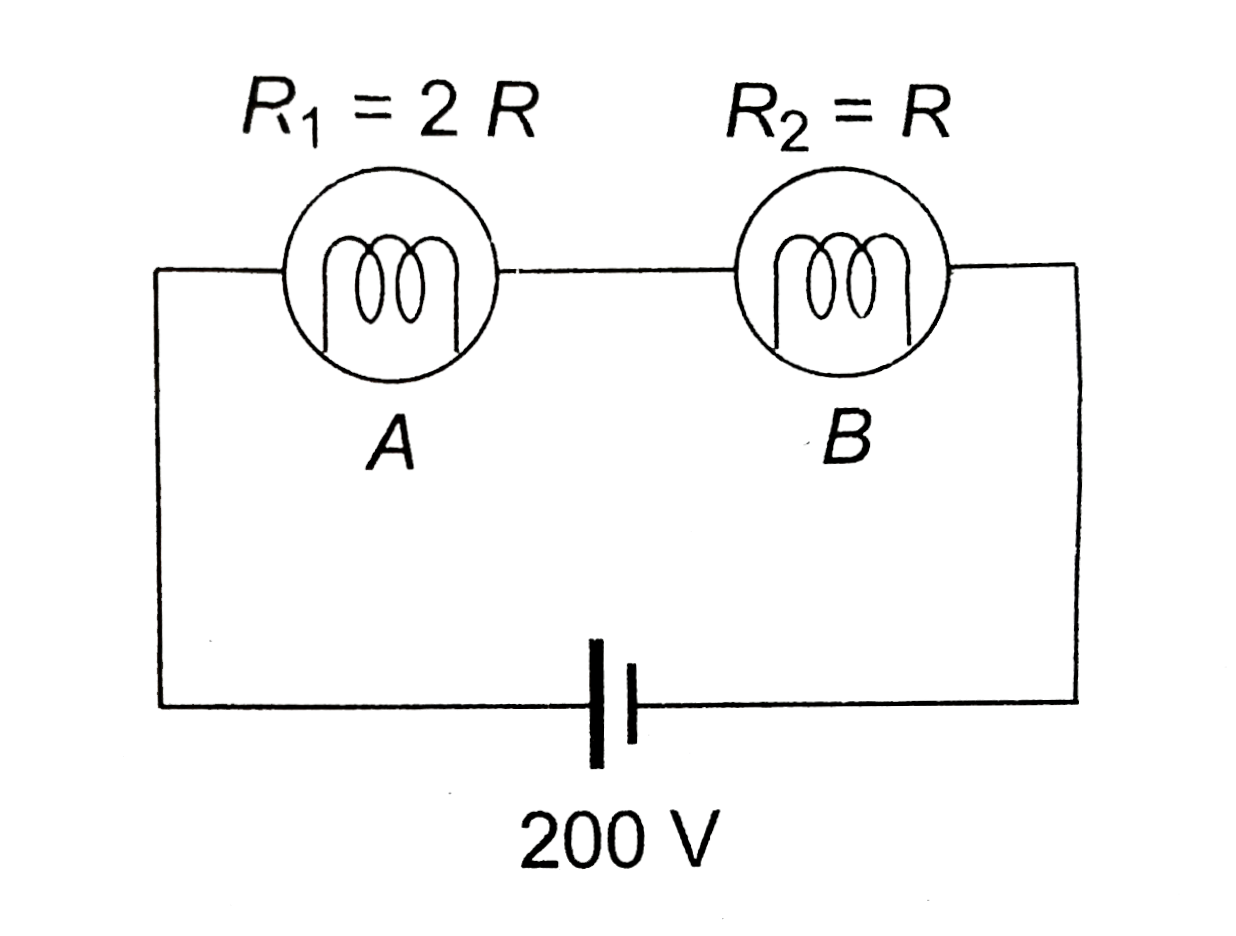These are two electric bulbs A and B rated 50W−100V, 100W−100V respectively. The bulbs are connected with a 200V dc supply.
The bulb A will fuse, if in series
(ii) The bulbs B will fuse , if in series
The bulb A will fuse, if in parallel
(iv) The bulb B will fuse if in parallel
(i),(ii)
(i),(iii),(iv)
(ii),(iii)
all
The correct Answer is:B

VA=2R2R+R×200=4003V>100V
Bulb A will fuse
VB200−4003=2003V>100V

Voltage across each bulb = 200V
Both bulbs will fuse .
Topper's Solved these Questions
- BOOK - CP SINGHCHAPTER - THERMAL AND ELECTRIC EFFECT oF CURRENTEXERCISE - Exercises101videos
THERMAL AND ELECTRIC EFFECT oF CURRENT
- BOOK - CP SINGHCHAPTER - SEMICONDUCTORSEXERCISE - Exercises140videos
SEMICONDUCTORS
- BOOK - CP SINGHCHAPTER - WAVE NATURE OF LIGHTEXERCISE - EXERCISES140videos
WAVE NATURE OF LIGHT
Similar Questions
Two bulbs are rated 30W−200Vand60W−200V. They are connected with a 400V power supply. Find which bulb will get fused if they are connected in (i) series and (ii) parallel.
View SolutionThere are two electric bulbs rated 60W. 110V and 100W, 110V. They are connected in series with a 220V d.c. supply. Will any bylb fuse? What will happen if they are connected in parallel with the same supply?
View Solution
Knowledge Check
- Question 1 - Select One
Two electric bulbs AandB are rated 60and100W, respectively. If they are connected in parallel to the same source , then
Aboth the bulbs draw the same currentBbulb A draws more current than bulb BCbulb B draws more current than bulb ADcurrents drawn in the bulbs are in the ratio of their resistances - Question 2 - Select One
Two electric bulbs A and B rated 200V - 100W and 200 V - 60 W are connected in series to a 200 V line. Then the potential drop across
AEach bulb is 200VB100W bulb is greater than that across 60 W bulbC100 W bulb is smaller than that across 60 W bulbDEach bulb is 100V - Question 3 - Select One
Two electric bulbs A and B are rated as 60 W and 100 W . They are connected in parallel to the same source. Then,
AB draws more current than ABCurrent draws are in the ratio of their resistacesCBoth draw the same currentDA draws more current than B.
There are two electric bulbs rated 60W. 110V and 100W, 110V. They are connected in series with a 220V d.c. supply. Will any bylb fuse? What will happen if they are connected in parallel with the same supply?
View SolutionTwo bulbs AandB are rated 100W−120Vand10W−120V respectively. They are connected across a 120V source in series. Which will consume more energy ?
View SolutionIf two bulbs of wattages 25 W and 100 W respectively, each rated by 220 V are connected in series with the supply of 440 V, then which bulb will fuse?
View SolutionIf two bulbs of wattage 25 and 100 respectively each rated at 220 volt are connected in series with the supply of 440 volt , then which bulbs will fuse
View SolutionIf two bulbs of wattage 25 and 100 respectively each rated at 220 volt are connected in series with the supply of 440 volt , then which bulbs will fuse
View Solution

